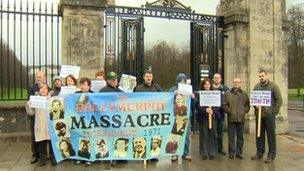Ballymurphy Army killings: campaign to lobby MEPs
- Published

The Ballymurphy campaigners pictured during a previous protest at Stormont
The families of 11 people killed by the Army in west Belfast more than 40 years ago are taking their campaign for an independent investigation to Europe.
The killings took place in the Ballymurphy area of the city over a three-day period in August 1971.
A priest and a mother of eight were among the civilians shot dead by the Parachute Regiment.
The families are going to Brussels to seek MEPs' support for an independent panel to investigate the deaths.
They are part of a 30-strong delegation, hosted by Sinn Féin MEP Martina Anderson, that includes various campaign groups and families.
The Ballymurphy shootings took place hours after the government introduced a policy of internment - the detention of paramilitary suspects without charge or trial.
The Parachute Regiment was involved in an operation in Ballymurphy to arrest people suspected of paramilitary activity.
The troops said they opened fire after they were shot at by republicans.
The priest, Fr Hugh Mullan, was shot as he went to the aid of a wounded man.
Last year, the Ballymurphy campaign group proposed that an independent panel would be chaired by the former Northern Ireland police ombudsman Nuala O'Loan.
They said they wanted the panel to examine all documents and papers relating to the deaths.
The group also wants an apology from the government.
In June 2012, the former Northern Ireland Secretary of State Owen Paterson turned down the campaigners' request for an inquiry.
The families said Mr Paterson told them it was "not in the public interest".
'Inaction'
The delegation heading to Brussels also includes Amanda Fullerton, the daughter of Sinn Féin councillor Eddie Fullerton who was murdered by the UDA in Buncrana, County Donegal, in 1991.
Her family believes the killers would have been caught if Mr Fullerton had been a councillor for any other party.
She said she wanted to "garner support on a European stage" for legal action her family was taking "to expose the inaction of the Irish government".
"Member states of the EU have three obligations under the European Convention on Human Rights - the first is the duty to refrain from unlawful deprivation of life, the second is the duty to investigate suspicious deaths thoroughly and the third is the positive obligation to prevent avoidable loss of life," she said.
"We believe the Irish government has failed on all three counts.
"For us, the bottom line is to get our case into the southern courts for the first time and expose the levels to which the Irish government was prepared to go."
She said the Police Ombudsman's Office in Northern Ireland would be issuing a report on her father's killing in the coming weeks.
- Published10 July 2013
- Published11 February 2013
- Published9 October 2012
- Published20 June 2012